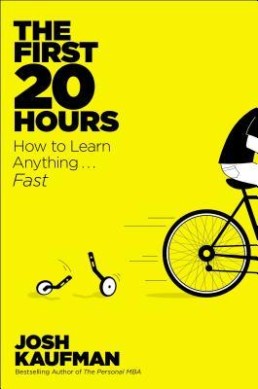“If you rely on finding time to do something, it will never be done. If you want to find time, you must make time.”
– Josh Kaufman, The First 20 Hours: How to Learn Anything … Fast
Take a moment to consider how many things you want to learn to do. What’s on your list? What’s holding you back from getting started? Are you worried about the time and effort it takes to acquire new skills—time you don’t have and effort you can’t spare?
Research suggests it takes 10,000 hours to develop a new skill. In this nonstop world when will you ever find that much time and energy? To make matters worse, the early hours of practicing something new are always the most frustrating. That’s why it’s difficult to learn how to speak a new language, play an instrument, hit a golf ball, or shoot great photos. It’s so much easier to watch TV or surf the web . . .
In The First 20 Hours, Josh Kaufman offers a systematic approach to rapid skill acquisition— how to learn any new skill as quickly as possible. His method shows you how to deconstruct complex skills, maximize productive practice, and remove common learning barriers. By completing just 20 hours of focused, deliberate practice you’ll go from knowing absolutely nothing to performing noticeably well.
Kaufman personally field-tested the methods in this book. You’ll have a front row seat as he develops a personal yoga practice, writes his own web-based computer programs, teaches himself to touch type on a nonstandard keyboard, explores the oldest and most complex board game in history, picks up the ukulele, and learns how to windsurf. Here are a few of the simple techniques he teaches:
Define your target performance level: Figure out what your desired level of skill looks like, what you’re trying to achieve, and what you’ll be able to do when you’re done. The more specific, the better.
Deconstruct the skill: Most of the things we think of as skills are actually bundles of smaller subskills. If you break down the subcomponents, it’s easier to figure out which ones are most important and practice those first.
Eliminate barriers to practice: Removing common distractions and unnecessary effort makes it much easier to sit down and focus on deliberate practice.
Create fast feedback loops: Getting accurate, real-time information about how well you’re performing during practice makes it much easier to improve.
Whether you want to paint a portrait, launch a start-up, fly an airplane, or juggle flaming chainsaws, The First 20 Hours will help you pick up the basics of any skill in record time . . . and have more fun along the way.
“The best thing that can happen to a human being is to find a problem, to fall in love with that problem, and to live trying to solve that problem, unless another problem even more lovable appears.”
“The trouble comes when we confuse learning with skill acquisition. If you want to acquire a new skill, you must practice it in context. Learning enhances practice, but it doesn’t replace it. If performance matters, learning alone is never enough.”
“Make dedicated time for practice. The time you spend acquiring a new skill must come from somewhere. Unfortunately, we tend to want to acquire new skills and keep doing many of the other activities we enjoy, like watching TV, playing video games, et cetera. I’ll get around to it, when I find the time, we say to ourselves. Here’s the truth: ‘finding’ time is a myth. No one ever ‘finds’ time for anything, in the sense of miraculously discovering some bank of extra time, like finding a twenty-dollar bill you accidentally left in your coat pocket. If you rely on finding time to do something, it will never be done. If you want to find time, you must make time.”

